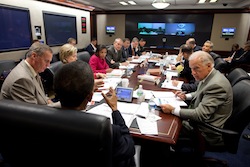The Nuclear Decision Point: Time to Do the Right Nuclear Thing
February 17, 2010
Featured Image
We are happy to serve you a daily summary of the day's top nuclear policy stories each morning, with excerpts from the stories in bullet form.
Stories we're following today:
Obama's Nuclear Decision - Joe Cirincione in the Huffington Post [link]
- Today an interagency working group on nuclear policy will meet at the principals level to finalize the administration's Nuclear Posture Review (NPR). This document will set US nuclear policy for the next five to ten years.
- The question is: Will this document chart a new strategy for the 21st century or will it continue to rely on 1940's weapons and a Cold War game plan?
- The Nuclear Posture Review must present a transformational doctrine. It must explain the budget, the new START treaty, why we must permanently end nuclear tests, how we are truly reducing nuclear weapons...and why other nations should, too.
- The secrecy [of the nuclear policy process] aids the status quo. It keeps it in the hands of the nuclear laboratories and contractors. It makes it harder for the public to have its voice heard. In a recent poll 84 percent of Americans said they would feel safer in a world where no nation, including the United States, had nuclear weapons.
START is Key to Reducing the Nuclear Threat - Matt Rojansky and James F. Collins in The Hill [link]
- With Presidents Barack Obama and Dmitry Medvedev expected to sign a final document within weeks, and ratification required to bring the treaty into force, the U.S. Senate is set to become ground zero in a contest between those on opposite sides of the administration’s broader nuclear agenda.
- But arguments from both hawks and doves have missed an urgent point: that without a new treaty, Washington will be unable to manage the risks associated with Russia’s vast nuclear arsenal, which still poses the single greatest existential threat to the United States.
- To protect America, we must agree to, and verify, limits on what the Russians have, know how they are using it, and take adequate steps to ensure that devastating weapons and dangerous materials remain safe from terrorist theft.
The US, Iran, and the Nuclear Dilemma: A Conversation with Jonathan Schell - The Huffington Post [link]
- Without a radical change of policy, there's very little chance that the US will be able to convince Iran to give up its nuclear program.
- Things might well be different if the world were to get serious about it's stated goal of eliminating nuclear weapons. Obama's goal of nuclear abolition should be on a much faster timetable -15 years, let's say.
- The fact is, the existing nuclear powers have to fish or cut bait: either get serious about surrendering their own nuclear arms or get used to others' getting them.
- If a bomb were used [by terrorists] on an American city, of what use are nuclear weapons? On the other hand, if you put technology under international control, then you reduce your risk by 95%. The very steps you need to move to nuclear zero and are the same steps that will protect us from new nations or groups acquiring nuclear weapons.
- NOTE: Jonathan Schell is a Ploughshares Fund grantee.
New IAEA Report on Iran This Week - Laura Rozen in Politico [link]
- The International Atomic Energy Agency is expected to issue a new report on Iran's nuclear program this week.
- Meantime, Reuters reports out of Vienna that it obtained a joint letter from the U.S., France and Russia to the IAEA that said Iran's plans to higher enrich uranium for nuclear medical use are "wholly unjustified."
- The letter is also important, another nuclear nonproliferation expert suggests, because it demonstrates that "Russia is standing with the U.S. in opposing Iran’s recent escalation, which runs counter to the view of many on Russia."



